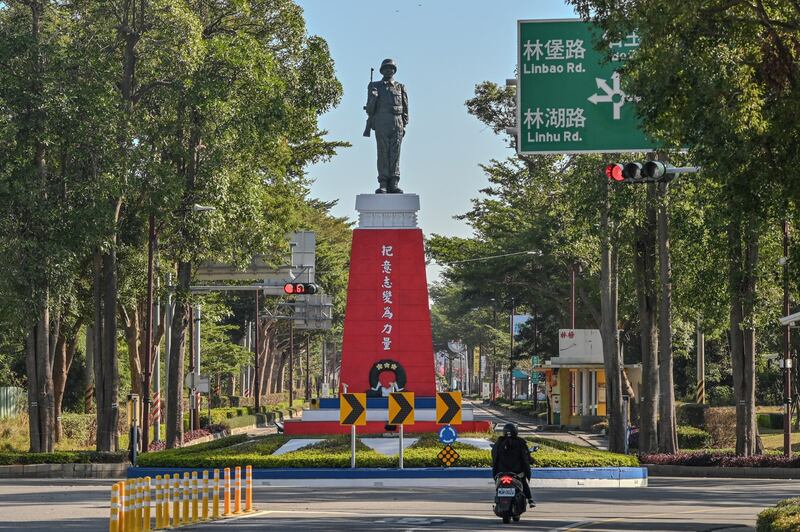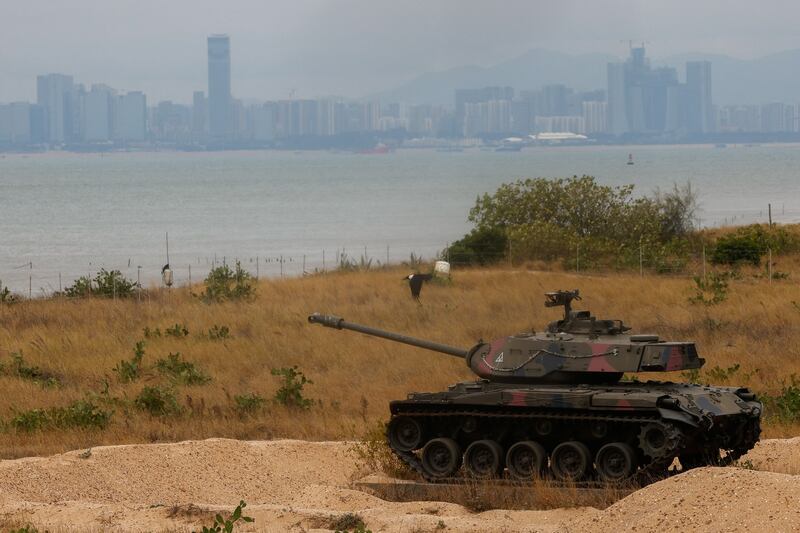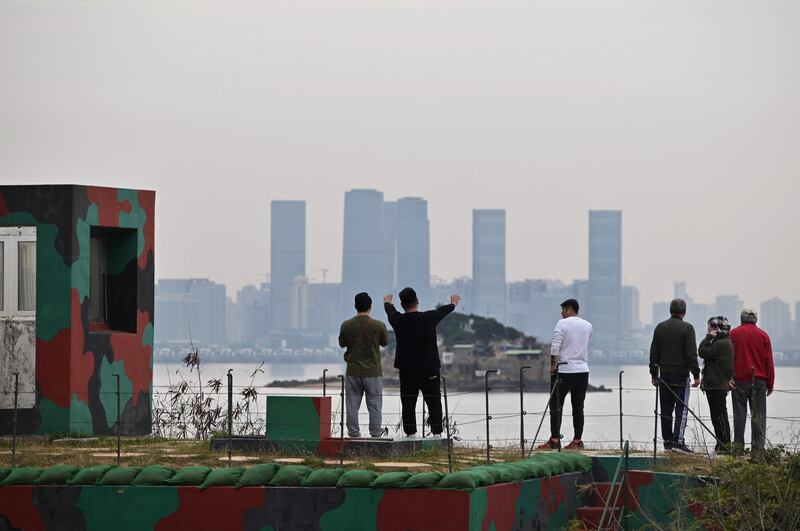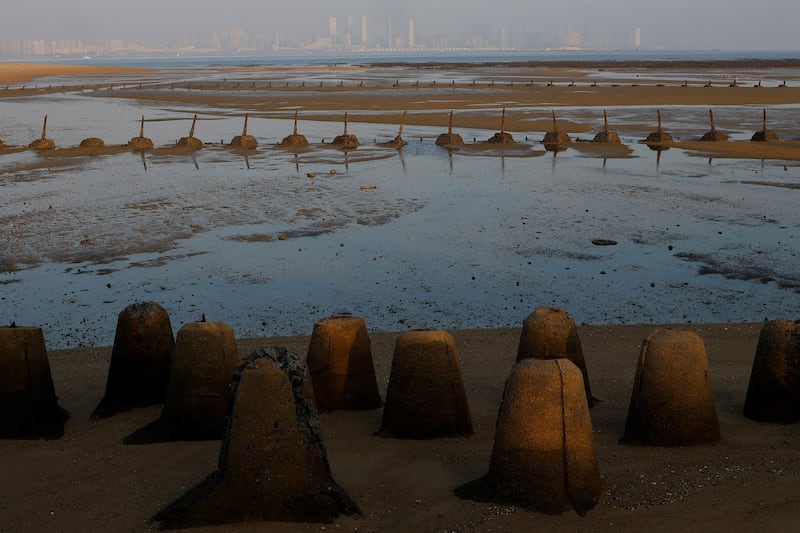S. Leo Chiang, whose short documentary "The Island Between" has just been nominated for an Oscar, grew up under the Kuomintang government of Taiwan, singing patriotic songs about how the Republic of China would one day join forces with the United States and run the evil communists out of mainland China.
Three decades later, revisiting the frontier island of Kinmen, just two miles across the sea from the southeastern Chinese city of Xiamen, he is more conflicted and pensive amid ongoing tensions – often military in expression – across the Taiwan Strait.
"Kinmen has been in the spotlight since the visit to Taipei by U.S. House Speaker Nancy Pelosi in August as cross-Strait tensions rose and China conducted large-scale military drills around Taiwan," reads the promotional material for his film, which had garnered more than 174,000 views by Wednesday on The New York Times’ YouTube channel.
The island was a key battlefield at the beginning of the Second Taiwan Strait Crisis in 1958 when Chinese troops fired nearly half a million artillery shells on the archipelago, which is roughly the size of Brooklyn, it says.

More recently, Kinmen has been visited by Chinese drones, prompting Taiwan's Democratic Progressive Party government to bolster the island's anti-drone defenses. The island has been shocked by the discovery that one of its generals was a Chinese spy.
Since then, Chiang has been putting his camera to work at the frontline of a war that has never been officially declared over by China, although it appears to have largely moved online for the time being.
"I knew that Kinmen had been the front line for Taiwan during the Chinese Civil War," Chiang says in the autobiographical film that includes family video clips and photos of his father who spent his national service on the island in 1968. "But it was still a shock to see that China is literally right there."
Island outpost
Chiang's camera lingers lovingly on the relics of the Chinese civil war: an abandoned tank on a beach; anti-landing spikes; a World War II era cannon fired to a ripple of applause for a tour group; a massive concrete speaker that plays sentimental hits by Taiwanese pop diva Teresa Teng and extols the benefits of a democratic way of life across the two miles of busy shipping lane that divides Kinmen from China.
His film portrays an island that has gotten used to its status as an outpost, whether of strident Republic of China nationalism in increasingly progressive Taiwan, or of resistance to China's far-reaching territorial claims on the democratic island and its 23 million residents, most of whom identify as Taiwanese, not Chinese.
"We were taught that we Taiwanese were Chinese in exile," he muses. "And, one day, with help from the U.S., we would retake China, freeing the mainland from the evil Communists, and Kinmen would be the launching pad."

Since then, Chiang has spent plenty of time in China, discovering instead "an exhilarating place, bursting with colors and possibilities," and wondering about his own identity as a holder of Taiwanese and U.S. passports, as well as a Chinese-issued travel document for "Taiwan compatriots."
He finds kindred spirits in Kinmen, where "folks ... were still expected to defend Taiwan, even though they have family and history just on the other side of the divide," allowing the viewer to eavesdrop on a conversation between two women with ties on both sides, who have no time for war. They just want the ferry links that were closed since the start of the COVID-19 pandemic in 2020 to reopen.
"More and more, I feel like a kid whose parents are involved in a three-way custody battle – hostile, codependent, manipulative – each pair with their own dysfunctions," Chiang says. "They all think they know what’s best for me. They don’t care what I want."
And the residents of Kinmen have their own special take on current tensions.
"Many in Kinmen think that China will never attack Taiwan, and the U.S. should stop interfering," he says in the film.
Special permit required
Meanwhile, Taiwanese need to get a special pass to visit Kinmen.
"It feels like a visa," Chiang told Radio Free Asia in a recent interview. "You have to get a permit, which implies that Kinmen isn't actually a part of Taiwan."
"One person even told me that they expect Taiwanese to flee to Kinmen if China invades ... because it would be the safest place [in Taiwanese territory]," he said, adding that he had run across a number of people born in China who had made their homes in Kinmen.
Another young man gave Chiang an interview for the film, but then withdrew permission for it to be used, citing concerns about Chinese agents "settling scores" once the film went public.

Other interviewees followed suit, citing similar reasons – a cultural habit of caution that further divides those who live on Kinmen from other Taiwanese.
"It's a sensitive topic, and they felt that there was always the danger that anything they said would come to the ears of China," Chiang said. "It felt a little sad, because [Taiwan] is so free. Can't they even express their own thoughts about their own families?"
"Kinmen still lives in fear, despite the ending of its status as a battlefield 32 years ago," he said.
‘Past ghosts’
While intended mostly for an international audience who may not be familiar with the details of life on the island, Chiang's poignant film appears to have struck a chord with a number of different people, judging from its YouTube reception.
"I was born in Kinmen," commented YouTube user @shanchang6488. "People in Kinmen don't want war to happen, there are traces of war everywhere we can see. We know the horrors of war."
"When I was young, I often heard stories from my grandparents and family about the war," they said. "It can be said that Kinmen people have not yet emerged from the shadow of the war."
"A lot of scenes had me hitting the pause button, and I was moved for a long time afterwards," user @shanlin2554 commented. "[This film] is worth your time."

User @headoverheels88 picked up on the casual way that Chiang's parents ask him what he plans to do in the event of a Chinese invasion.
"It's like watching past ghosts for a war that hasn't happened yet," they wrote. "Ghosts from the future."
Chiang ends his film with a nod to those ghosts, noting that Taiwanese compulsory military service has been extended to one year for all eligible men, starting in 2024.
"When these young men arrive in Kinmen, will they be surprised, like I am, by the peaceful sunsets –the same ones that my father must have seen when he served here all those years ago – and by the kindness of the people here who are forever caught in between?"
Translated by Luisetta Mudie .

